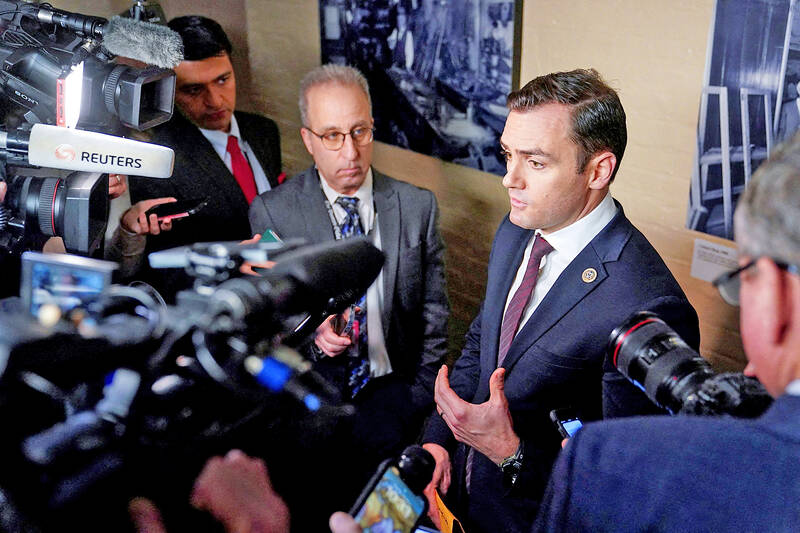A US congressional committee on Thursday questioned the US Navy over what it called “alarming delays” in weapons deliveries to Taiwan, asking why production sometimes languished for months or years after purchasing deals were signed.
Time was running out to deter military action by China toward Taiwan, US Representative Mike Gallagher, chair of the House of Representatives’ Select Committee on the Chinese Communist Party, and US Representative Young Kim, chair of the House Foreign Affairs Subcommittee on the Indo Pacific, said in the letter to US Secretary of the Navy Carlos Del Toro.
With more than 340 warships, China possesses the largest naval fleet in the world, and deterring a Chinese invasion of Taiwan “will require turning the island into a porcupine, stockpiled with an arsenal of weapons that can target the Chinese fleet and prevent the PLA [People’s Liberation Army] from establishing a lodgment in Taiwan,” the letter said.

Photo: Reuters
“At this hour of danger, however, when the United States should be arming Taiwan to the maximum to strengthen its defenses and deter Chinese aggression, bureaucratic delays within the Navy are impeding the timely production and delivery of key weapons to Taiwan,” the letter said.
The lawmakers highlighted the need for anti-ship Harpoon and Standoff Land Attack Missile-Expanded Response (SLAM-ER) missiles, both of which the US agreed years ago to sell to Taiwan.
It took until April for the navy to enter a contract for production of 400 ground-launched Harpoon missiles to Taiwan, the lawmakers wrote, adding that was two-and-a-half years after the US Department of Defense’s October 2020 announcement of the sale to Taiwan of the weapons, they said.
That risked putting delivery beyond 2027, the year US officials say is China’s target date to be ready to conduct an invasion, they added.
Gallagher and Kim said 10 months after Taiwan signed a letter of acceptance to purchase 60 air-launched Harpoons and 135 SLAM-ER missiles in December last year, the navy still had not asked contractors to submit bids for production.
Such lengthy timelines are not unique to those two systems, they added.
“The inability to supply key weapons at such a consequential moment in our efforts to prevent war is deeply troubling,” they said, asking the navy to clarify deadlines for Harpoon delivery and requests for bids for those missiles, and provide assessments for speeding up contracting and production.
China has repeatedly demanded the US end what Beijing sees as Washington’s provocative support for Taiwan’s military.
The US is Taiwan’s most important arms supplier, and top US military leaders have also acknowledged the need to speed up delivery.
Taiwan has in recent years complained of delays to other US weapon deliveries, such as Stinger anti-aircraft missiles. Taipei has asked the US at times to turn to alternate suppliers or allies to help source equipment.
Additional reporting by CNA

Conflict with Taiwan could leave China with “massive economic disruption, catastrophic military losses, significant social unrest, and devastating sanctions,” a US think tank said in a report released on Monday. The German Marshall Fund released a report titled If China Attacks Taiwan: The Consequences for China of “Minor Conflict” and “Major War” Scenarios. The report details the “massive” economic, military, social and international costs to China in the event of a minor conflict or major war with Taiwan, estimating that the Chinese People’s Liberation Army (PLA) could sustain losses of more than half of its active-duty ground forces, including 100,000 troops. Understanding Chinese

The Ministry of Foreign Affairs (MOFA) yesterday said it is closely monitoring developments in Venezuela, and would continue to cooperate with democratic allies and work together for regional and global security, stability, and prosperity. The remarks came after the US on Saturday launched a series of airstrikes in Venezuela and kidnapped Venezuelan President Nicolas Maduro, who was later flown to New York along with his wife. The pair face US charges related to drug trafficking and alleged cooperation with gangs designated as terrorist organizations. Maduro has denied the allegations. The ministry said that it is closely monitoring the political and economic situation

‘SLICING METHOD’: In the event of a blockade, the China Coast Guard would intercept Taiwanese ships while its navy would seek to deter foreign intervention China’s military drills around Taiwan this week signaled potential strategies to cut the nation off from energy supplies and foreign military assistance, a US think tank report said. The Chinese People’s Liberation Army (PLA) conducted what it called “Justice Mission 2025” exercises from Monday to Tuesday in five maritime zones and airspace around Taiwan, calling them a warning to “Taiwanese independence” forces. In a report released on Wednesday, the Institute for the Study of War said the exercises effectively simulated blocking shipping routes to major port cities, including Kaohsiung, Keelung and Hualien. Taiwan would be highly vulnerable under such a blockade, because it

UNRELENTING: China attempted cyberattacks on Taiwan’s critical infrastructure 2.63 million times per day last year, up from 1.23 million in 2023, the NSB said China’s cyberarmy has long engaged in cyberattacks against Taiwan’s critical infrastructure, employing diverse and evolving tactics, the National Security Bureau (NSB) said yesterday, adding that cyberattacks on critical energy infrastructure last year increased 10-fold compared with the previous year. The NSB yesterday released a report titled Analysis on China’s Cyber Threats to Taiwan’s Critical Infrastructure in 2025, outlining the number of cyberattacks, major tactics and hacker groups. Taiwan’s national intelligence community identified a large number of cybersecurity incidents last year, the bureau said in a statement. China’s cyberarmy last year launched an average of 2.63 million intrusion attempts per day targeting Taiwan’s critical